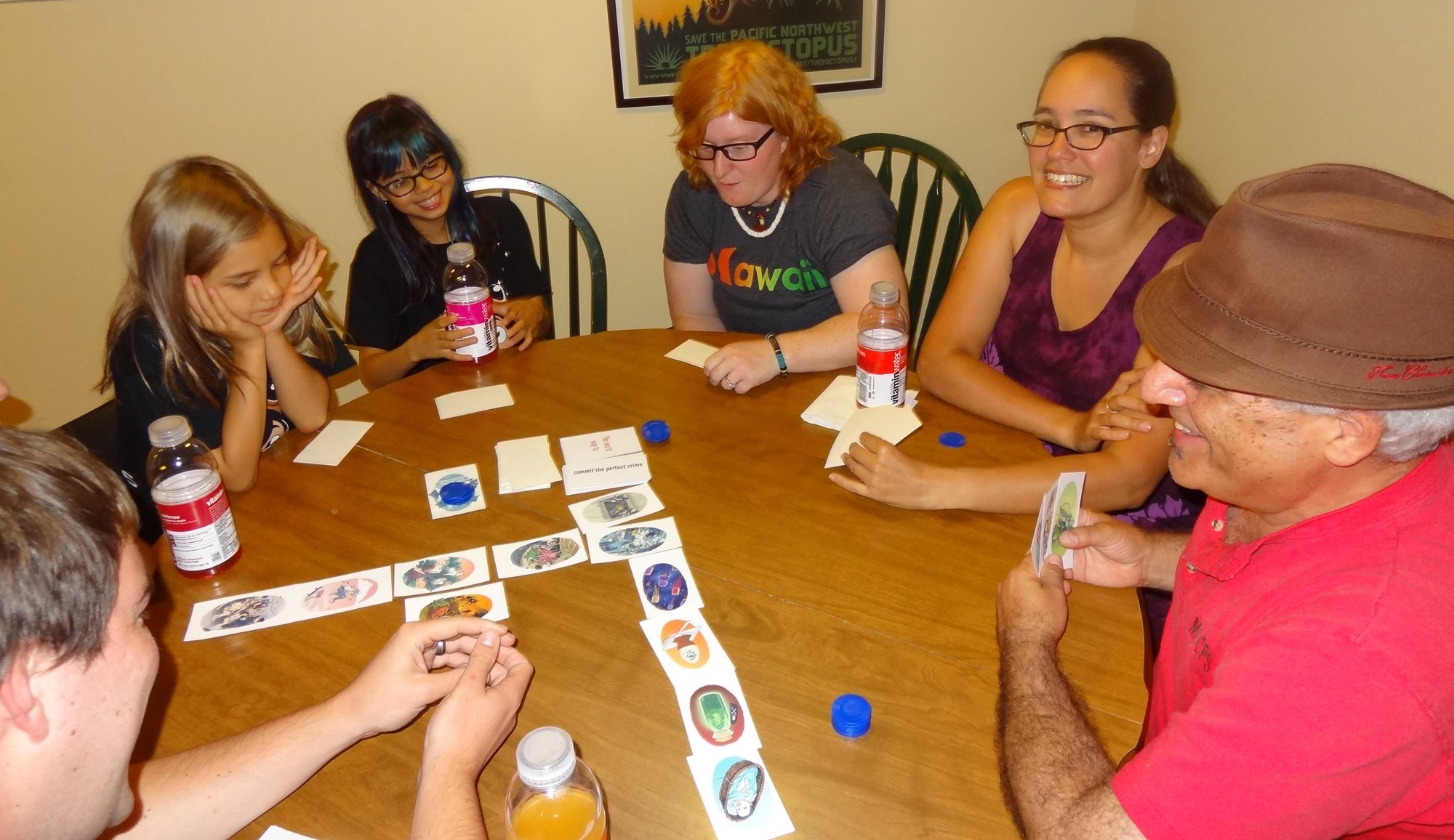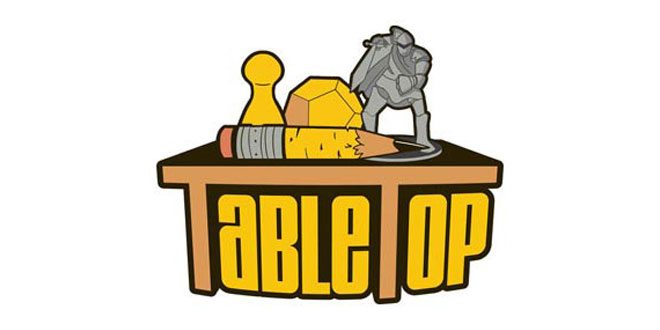If you like games like Dixit that involve storytelling and cool artwork, here’s a Kickstarter project you should look at: JUX. It’s a little more story-building and less points-based than Dixit, and a lot of fun for a big group.
At a glance: JUX is a collaborative storytelling game for 2 to 8 players (though that’s flexible), ages 13 and up (also flexible), and takes about 30 minutes to play. It’s currently on Kickstarter raising funds for production. A copy of the game comes with the $24 pledge, or you can get a print-and-play version for a $12 pledge.
Regarding the age recommendation, there are some cards with images that may not be entirely appropriate for younger kids, as well as story starter cards (“hide a body,” for instance) that you might want to set aside. But the game itself and most of the cards could be kid-friendly. I played with my 7-year-old and 10-year-old and had a good time.

Components
I’ve only played with a demo prototype, which had a portion of the cards, but this is what’s planned for the final version:
- 125 Image Cards, featuring original illustrations by Noah Patrick Pfarr
- 75 Objective Cards
- 1 Best/Worst Way Card
- 24 Story Tokens
- 8 Reference Cards
- Free Minibook: Intro to Everyday Critical Thinking, by Dr. Peter Boghossian
The artwork is fantastic. Pfarr has done illustrations for Entertainment Weekly, among other publications, and I really love the humor in the drawings. There are a lot of visual puns and clever references, and there are also a lot of characters and objects that appear in multiple cards, creating fun links between them.
How to play
You can get a mini black-and-white demo version as a PDF here, in case you’d like to try JUX out for yourself.
The basic idea of the game is to compose a (long) sentence using the various cards as inspiration. The sentence starts with two cards: first you’ll pick either “The best way to…” or “The worst way to…” and then pick one of the objective cards at random. The objectives include things like “solve a murder,” “defeat a zombie,” and “go on vacation.”
Each player has a hand of cards. The idea is that you take turns adding cards, using the illustrations as seed for the story. Note that your story doesn’t have to involve the exact scene pictured in the card—it’s enough just to use a word or phrase inspired by the card. Each time you add a card, you repeat the sentence from the beginning.

However, if you choose, you can also branch off in a different direction from any card that’s currently active. You give a reason for branching off, and other players get the chance to challenge—there’s a short kibbitzing session and a vote if necessary. If players approve the new branching, then the old cards get turned sideways to show that they’re no longer active. (As you can see in the photo above, one segment was deactivated, and a player is currently trying to suggest a new branching.)
If you feel like you have a conclusion to the sentence, you may also propose that, and players may vote on that.
The Story Tokens are awarded to players who win a challenge or successfully end a story, but they can also be given to people for telling a good story. They basically serve as a thumbs up or Like or +1: if you like what somebody said, grab a token and hand it to them.
The game goes until you run out of image cards (or a predetermined amount of time). The player with the most Story Tokens is the best Storyteller.
The Verdict
Strictly speaking, JUX might be considered more of an activity than a game—while there are specific instances in which you win some number of Story Tokens, there’s also the very subjective “otherwise contributing to the fun” criteria. In the end, it’s not necessarily the sort of game you’re playing for points, but rather to tell a fun story.
It reminds me somewhat of things like Rory’s Story Cubes or Jason Tagmire’s Storyteller Cards; the real goal is to come up with a story together, and the scorekeeping is somewhat beside the point. That said, it is a lot of fun to play and can be pretty silly, depending on the players involved.
As I mentioned above, some of the objective cards and illustrations may not be entirely appropriate for kids, but the game itself could easily be played with kids, if parents go through the decks to remove things that they didn’t deem kid-friendly. Other than that, it’s actually a pretty good exercise for kids: they have to pay attention to the ongoing story so they can repeat it, and come up with ways to add to the story based on the cards in their hands.

Here’s one of the stories from our game: pictured above, this resulted in the record for the longest linear story told in JUX to date: “The best way to greet a space alien is to prepare a delicious meal made of sugar, sugar, and more sugar, in its natural habitat, which happens to be the garden, where a rabbit is digging up all the vegetables and sending a rescue dog to rescue the other aliens, who have crash landed; and meanwhile you treat the aliens to a 24-hour day, which they have never experienced, during which time you show them the best of modern art and great literature, and introduce them to cuddling, and then offer them a selection of strange things in bottles, which they think are fantastic and take with them back home on a jet made of clouds.”
My kids and I had a blast with this one, and even though I don’t think the core concept itself is a new one, the rules for branching stories and the illustrations by Noah Patrick Pfarr make JUX a winner. Elbowfish Games (also the publisher of Antimatter Matters) has about two weeks left in their Kickstarter campaign, so take a look!





